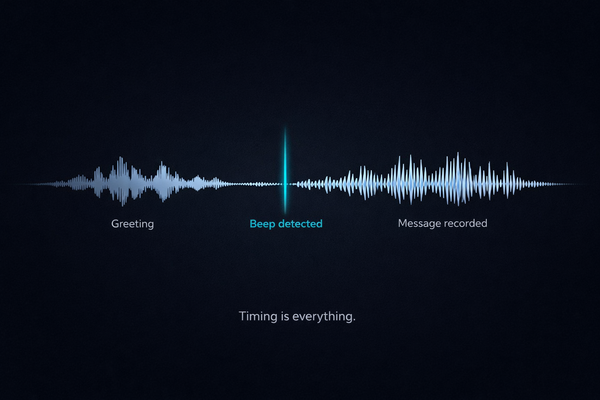[Meet The Team] The Future of Voice AI: Insights from Karthik Ganesan at Anyreach
![[Meet The Team] The Future of Voice AI: Insights from Karthik Ganesan at Anyreach](/content/images/size/w1200/2025/06/Meet-the-team-Karthik.png)
Voice AI is evolving beyond simple commands to sophisticated conversational agents. Building truly human-like voice interactions requires more than just advanced models—it demands purpose-built data and ethical implementation.
In this episode of Anyreach Roundtable's "Meet The Team" series, Richard Lin speaks with Karthik Ganesan, CTO and Co-founder at Anyreach, about his journey from using AI to practice conversations to revolutionizing enterprise voice agents. They explore the technical evolution from LSTMs to LLMs, the limitations of foundation models, and why the future of voice AI lies in agentic systems built on ethical data practices.
Key Takeaways
• Personal Problems Drive Innovation – Karthik's journey began with a relatable challenge: using chatbots to practice conversations, which evolved into an eight-year mission to build human-like voice agents.
• Context Over Classification – Rather than trying to classify emotions, effective voice AI understands context and responds naturally, just like humans do.
• Open Source Can Compete – With proper data and techniques, smaller open source models can rival proprietary giants, as proven by Starling Beta outperforming ChatGPT 3.5.
• Foundation Models Aren't Enough – The "cocktail problem" of mixing everything together loses the specific character needed for individual use cases.
• Agentic Systems Win – Multiple specialized speech LLMs working together like a "wolf pack" outperform single monolithic models.
• Ethics Matter – Voice AI requires consent-based data collection and proactive safety measures to handle the 20% of cases where agents fail.
The Unconventional Beginning: From Dating Anxiety to Voice AI Pioneer
As a trained computer scientist with a very human problem, Karthik Ganesan found himself in 2017 struggling with conversation anxiety. Rather than taking traditional advice, he channeled this challenge into building chatbots and voice bots for practice.
This personal challenge became the catalyst for envisioning "a thousand times better version of voicemail" as the future of human-AI interaction.
The Technical Evolution: From LSTMs to Contextual Understanding
Karthik's academic journey at Carnegie Mellon positioned him at the forefront of dialogue systems research. Starting with Long Short-Term Memory networks in 2017, he witnessed the fundamental challenges of early voice AI where simply understanding user intent was extraordinarily difficult.
His experiences at Robert Bosch and Mercedes Benz led to a crucial realization about emotion recognition:
At Amazon Alexa, he tackled the "rare words" problem—why Alexa played popular artists instead of the less common ones users actually requested.
The Open Source Revolution: Democratizing Advanced AI
When ChatGPT emerged in 2022, Karthik didn't just observe—he acted. Working with UC Berkeley researchers, his team created Starling Beta, one of the first open source models to outperform ChatGPT 3.5 using a 7-billion parameter Llama2 model.
His subsequent coding models achieved such impressive results that he experienced a surreal moment:
The Data Crisis: Why Foundation Models Fall Short
This success revealed a critical insight about the limitations of foundation models. Karthik argues that trying to build "AI for everyone" creates what he calls the "cocktail problem."
The solution isn't better prompting but purpose-built data, especially the wealth of unspoken knowledge that exists only in people's heads, not in written form online.
Building Anyreach: The Agentic Voice AI Revolution
Rather than relying on single monolithic models, Anyreach pioneers "agentic voice AI systems"—multiple specialized speech LLMs working together.
The key differentiator is spontaneous data collection through role-play scenarios and user simulators, capturing natural conversational flow rather than performative content.
The Ethics and Safety Imperative
Unlike companies using scraped data without consent, Anyreach takes a different approach to data collection and safety.
But ethical data is just the beginning. The real challenge is the 20% of cases where voice agents fail:
Anyreach's solution includes proactive call transfer technology that detects user frustration and automatically routes to human agents when needed.
The Future: Beyond the Hype Cycle
Looking ahead, Karthik warns against the industry's rush to deploy "okay-ish agents" with plans to improve iteratively. Voice AI isn't like mobile apps—it needs to work perfectly from day one, especially for mission-critical applications like emergency services.
Perhaps most importantly, he identifies AI wealth disparity as a growing concern:
Preserving Culture in the Age of AI
At its core, Anyreach's mission is ensuring that technology democratizes access to excellent service rather than creating new barriers.
The goal isn't to create an entirely new AI-driven world, but to "checkpoint the world the way it is" and enhance it with AI while preserving human culture, language, and identity.
Conclusion
As voice AI becomes ubiquitous, companies like Anyreach carry the responsibility of ensuring this technology serves humanity rather than replacing it. Through ethical data practices, rigorous safety measures, and a commitment to quality across all customer segments, they're working to make voice AI a tool for human flourishing rather than frustration.
The future belongs to those who can build voice AI that works perfectly from day one while maintaining the human connections that make conversations meaningful—and Karthik Ganesan at Anyreach is leading the way.
How to connect with Karthik from Anyreach
Keywords: AI, agentic systems, conversational AI, ethical AI, speech recognition, dialogue systems, open source AI, human-AI interaction




![[AI Digest] Agents Coordinate Plan Deploy Scale](/content/images/size/w600/2025/07/Daily-AI-Digest.png)